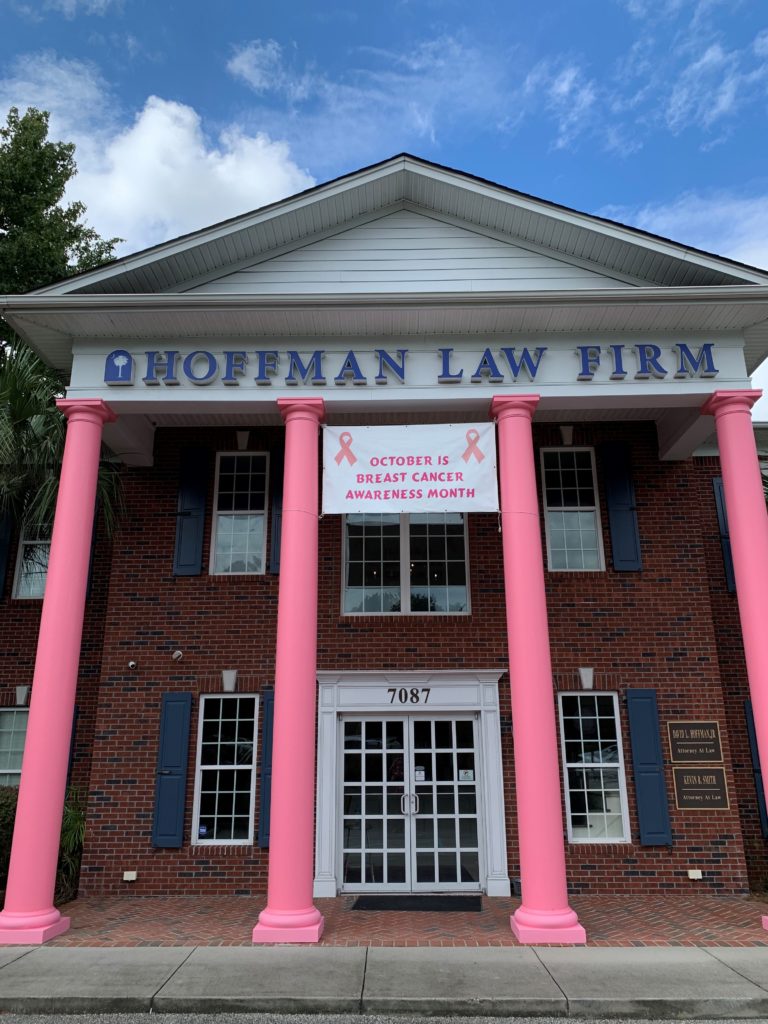Hoffman Law Firm Supports Breast Cancer Awareness in 2022

Hoffman Law Firm is a strong supporter of breast cancer survivors, advocating for awareness here in our community. We even paint our columns pink during Breast Cancer Awareness Month – and the tradition has continued this year!
Do Men Get Breast Cancer?
While breast cancer is most commonly found in women, men can get it as well. About 1% of all breast cancer diagnoses in the U.S. are found in a man – with invasive ductal carcinoma being the most common.
Here are some 2022 estimates for breast cancer in men, according to the American Cancer Society:
- For men, the lifetime risk of getting breast cancer is about 1 in 833.
- About 2,710 men will receive an invasive breast cancer diagnosis.
- About 530 men will die from breast cancer.
- Breast cancer is about 100 times less common among white men than white women.
- Breast cancer in men is about 70 times less common among black men than black women.
- Black women and men with breast cancer often have a worse prognosis.
Common Types of Breast Cancer for Men
These types of breast cancer are the most common in men:
Invasive Ductal Carcinoma
Cancer cells begin in the ducts and then spread into other parts of the breast tissue. Invasive cancer cells can also spread, or metastasize, to other body parts.
Invasive Lobular Carcinoma
Cancer cells begin in the lobules before spreading to nearby breast tissues. These invasive cancer cells can also spread to other regions of the body.
Ductal Carcinoma In Situ (DCIS)
Ductal carcinoma in situ (DCIS) is a breast disease that may lead to invasive breast cancer. The cancer cells are found exclusively in the duct lining, and have not yet spread to other tissues.
Common Symptoms
These symptoms may indicate breast cancer, so it is important to be on the lookout for them. Because they may also indicate another condition, be sure to schedule an appointment with your doctor right away.
- A lump or swelling in the breast
- Pain in the nipple area
- Redness or flaky skin in the breast
- Nipple discharge
- Irritation or dimpling of breast skin
- Pulling in of the nipple
Risk Factors
These factors increase a man’s risk of developing breast cancer:
Aging
Most breast cancers are found after age 50, proving that the risk increases with age.
Genetic Mutations
Inherited changes in certain genes, such as BRCA1 and BRCA2, increase the risk for breast cancer.
Family History of Breast Cancer
A man’s risk for breast cancer is higher if a close family member has had it.
Radiation Therapy Treatment
Males who were treated with radiation therapy to the chest have a higher risk of getting breast cancer.
Hormone Therapy Treatment
Drugs containing estrogen that were used to treat prostate cancer in the past have been linked to an increased breast cancer risk.
Klinefelter Syndrome
Klinefelter syndrome is a rare genetic condition marked by an extra X chromosome. This can cause a man’s body to produce higher levels of estrogen and lower levels of androgens (hormones that help develop and maintain male sex characteristics).
Testicle Concerns
Injury to, swelling in, or surgery to remove the testicles can increase breast cancer risk.
Liver Disease
Cirrhosis of the liver can simultaneously lower androgen levels and boost estrogen levels in males, raising their risk of developing breast cancer.
Overweight/Obesity
Older men who are overweight or obese face an increased risk of getting breast cancer, compared to males at a healthy weight.
How Can a Man Get Breast Cancer Screening in Charleston, SC?
Ask your primary care provider about where to schedule a breast cancer screening. It’s no secret that prevention saves lives, so talk to your doctor today!
Just like in women, treatment for breast cancer in men depends on the size of the tumor and how much it has spread. Once detected, treatment may include surgery, chemotherapy, radiation therapy, hormone therapy, and targeted therapy. To learn more about Male Breast Cancer Treatment, please visit the National Cancer Institute’s website.
Here are some local medical centers in Charleston, SC offering breast cancer screenings:
MUSC Health – Hollings Cancer Center
Breast Specialist Available
86 Jonathan Lucas St
Charleston, SC 29425
843-792-8439
Breast Specialist Available
2145 Henry Tecklenburg Dr.
Charleston, SC 29414
(843) 402-5000
Schedule your appointment online
Breast Specialist Available
9313 Medical Plaza Dr.
Suite 201
Charleston, SC 29406
877-357-0156
Schedule your appointment online
Hoffman Law Firm Fights Year-Round

Just because our columns’ pink paint will disappear next month doesn’t mean that our personal injury attorneys will stop fighting for you! Our team at Hoffman Law Firm is here to help year-round, offering trusted legal advice when you need it most!
If you have been injured, we are eager to get connected and to start a trusted attorney-client relationship. Contact us today to schedule your free consultation!
Our personal injury law firm offers trusted legal representation in a wide variety of cases here in the Lowcountry, including:
Personal injury
Car Accident
Truck Accident
Motorcycle Accident
Workers’ Comp
Wrongful Death
Medical Malpractice
Dog Bite
Brain Injury
Spinal Cord Injury
Nursing Home Abuse
Other Helpful Community Involvement Blogs:
Pretty in Pink: Hoffman Law Firm Creates Awareness for Breast Cancer 2021
Think Pink: Hoffman Law Firm Raises Awareness 2020
A Sponsorship Worthy of the Spotlight
Additional Platforms Supporting Breast Cancer Awareness for Males:
American Cancer Society – Breast Cancer in Males
National Cancer Institute – Male Breast Cancer Treatment
Mayo Clinic – Men Breast Cancer
Medical Disclaimer
Any medical information referred to in or through our site is given as information only and is not intended:
- as medical diagnosis or treatment
- to replace consultation with a qualified medical practitioner
- to advocate or recommend the purchase of any product or to endorse or guarantee the credentials or appropriateness of any health care provider
We strongly suggest you consult a healthcare professional for specific advice about your situation.
